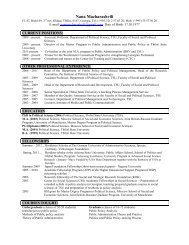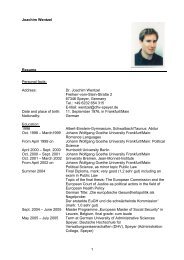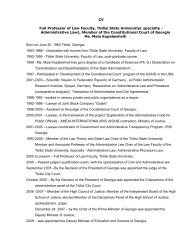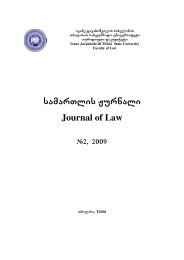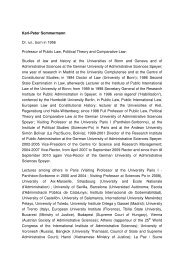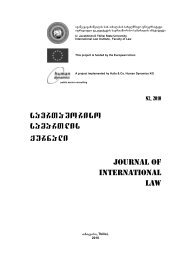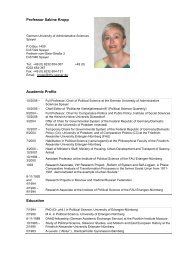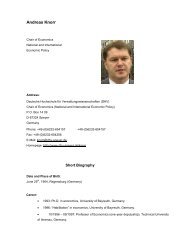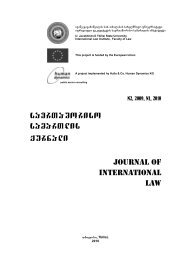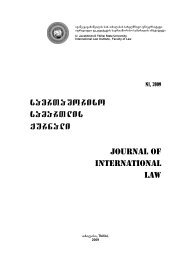Untitled
Untitled
Untitled
You also want an ePaper? Increase the reach of your titles
YUMPU automatically turns print PDFs into web optimized ePapers that Google loves.
M. GOTSIRIDZE, DIPLOMATIC PROTECTION OF NATURAL AND LEGAL PERSONS IN INTERNATIONAL ...<br />
certain stage of the court proceeding, it would<br />
be logical to conclude that probability of<br />
changing nationality by a national is rather<br />
high. Furthermore, attention shall be given to<br />
the fact that often changing of nationality does<br />
not depend on a desire of an individual and it<br />
happens automatically, independently from<br />
him/her. In such case individual remains without<br />
any protection.<br />
Principle of "Continuous Nationality" certainly<br />
was envisaged in draft Articles by the<br />
International Law Commission. But high qualified<br />
members of the Commission were more<br />
flexible and allowed some exceptions from this<br />
rule. The Commission determined that a person<br />
must be a national of a State continuously<br />
from the date of injury to the date of official<br />
presentation of the claim to the Court. 78<br />
Though the Commission taking into consideration<br />
that there is no agreement in international<br />
community on necessity to retain nationality<br />
between these two dates, decided that if<br />
continuity can not be proved possession of<br />
nationality on both dates will be considered<br />
in accordance with the role on "continuous<br />
nationality." 79 The mentioned Principle of "Continuous<br />
Nationality" is applicable in respect to<br />
diplomatic protection of both natural and legal<br />
persons. 80 The Commission determined<br />
correctly that if we recognize the Principle of<br />
"Continuous Nationality" we shall take into<br />
consideration the interests of persons and allow<br />
certain fair exceptions from this rule. It is<br />
possible to exercise diplomatic protection on<br />
behalf of natural persons by avoiding the<br />
present principle if the following conditions are<br />
met: a) the person seeking diplomatic protection<br />
had the nationality of a predecessor State<br />
or has lost his or her previous nationality; b)<br />
the acquisition of the new nationality is not<br />
related to exercising diplomatic protection in<br />
respect of this person; c) the acquisition of<br />
the new nationality has taken place in a manner<br />
not inconsistent with international law. 81<br />
Here the Commission applied the rule stipulating<br />
that a State is no longer entitled to exercise<br />
diplomatic protection in respect of a<br />
corporation that acquires the nationality of the<br />
Applicant State. 82 However, the Commission in<br />
respect with the corporations has allowed both<br />
negative and positive exceptions. Authors of<br />
the project took into consideration the opinion<br />
that none of the State may exercise diplomatic<br />
protection on behalf of the corporation<br />
in case of liquidation of the corporation in the<br />
State of incorporation. Consequently the Commission<br />
allowed exception and determined a<br />
State continues to be entitled to exercise diplomatic<br />
protection in respect of a corporation<br />
which was its national at the date of injury and<br />
which, as the result of the injury, has ceased<br />
to exist according to the law of the State of<br />
incorporation. 83 The regime regarding the principle<br />
on "continues nationality", established in<br />
relation to corporations extends to non-profitmaking<br />
legal persons by analogy. 84<br />
CONCLUSION<br />
At the beginning we raised a question, in<br />
what extend the diplomatic protection is accessible<br />
for an ordinary citizen, whose rights<br />
were violated and injured by action of foreign<br />
State. Abovementioned detailed analyze of the<br />
mentioned institute certainly does not provides<br />
for the opportunity to consider diplomatic protection<br />
as alternative, accessible and real remedy<br />
of satisfaction of the citizen.<br />
In the frames of current international law,<br />
exercise of diplomatic protection falls under<br />
the discretion of the State, and it is the discretion<br />
process during which a person initially is<br />
forced to conduct negotiations and petition<br />
with herl his own State, in order to submit the<br />
dispute to international justice. Especially in<br />
cases when for the violating rights a person<br />
there is no adequate, accessible and effective<br />
remedy, it is totally inadmissible to leave<br />
the discretion of exercising diplomatic protection<br />
to the State. Contemporary State practice<br />
inclines to bind a State at least partially to exercise<br />
diplomatic protection. Although, until<br />
this mechanism maintains the discretionary<br />
character, it can not be considered as an accessible<br />
and alternative remedy for the protection<br />
of citizens. Regrettable result which is<br />
followed by the mentioned discretion was clearly<br />
illustrated by NGO Amnesty International:<br />
The States frequently sacrifice the legal rights<br />
of the victims to those political interests, such<br />
as maintenance of friendly relations with a<br />
State responsible for the violation. 85<br />
Analyse provided for by the present paper<br />
made clear that non-existence of the obligation<br />
of diplomatic protection is not the only<br />
problem connected to this mechanism. Prior<br />
to the exercise of diplomatic protection there<br />
are numerous formal and procedural precon-<br />
245



